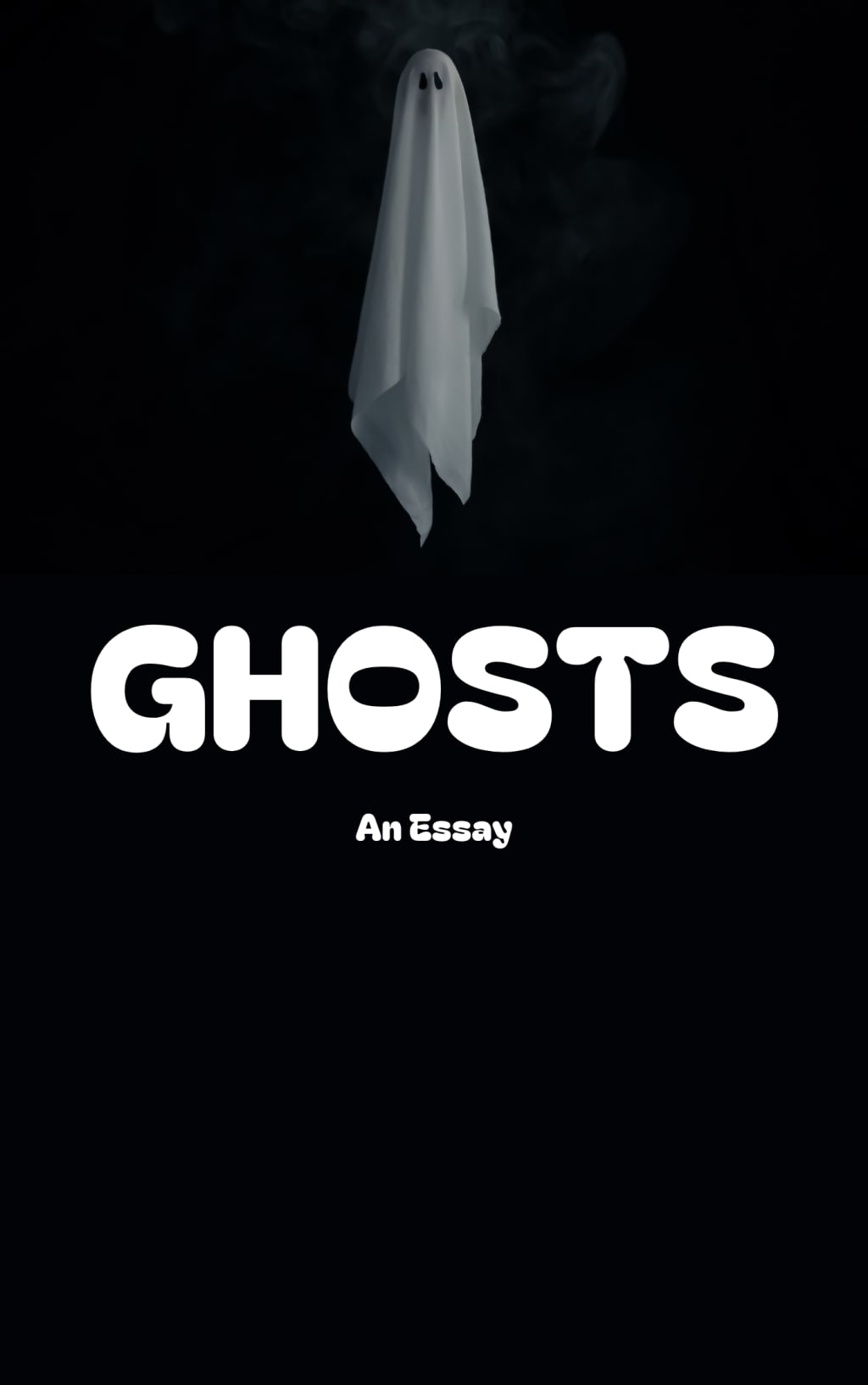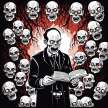
I had a birthday party at my house when I was about ten years old. My home had a massive basement at the time, and all the kids were downstairs having fun doing whatever we did back then. When the pizza finally came, and my parents called us upstairs to eat, I was the second to last person up the stairs to grab my slice. As I went up the stairs, a childhood friend of mine kicked over a soda as he ran. I didn’t say anything, I assumed he would clean it up before he ate. The can was nearly empty, and it wasn’t a big deal. When we came back downstairs full of more soda and pizza, I saw the spill was still there. I knew who did it, but the other kids asked, “How did that happen?” Another kid said it was a ghost, and without question, I confirmed my house was haunted. Throughout elementary school, my house was known as the haunted house. It legitimately scared some kids, and I fed into their belief in the paranormal.
Around that time, weird things began to happen in my home. I couldn’t explain it then. I always told myself that when I get older, I will find out the real reason why whatever happened happened. Prepare for my bold statement. Ghosts are not real. You can argue with me, and I will listen quietly and be polite, nod my head, and pay close attention to your stories. At the end of the day, you did not change my mind. I won’t tell you that. I would just let you tell your story, and I’ll comment, “Wow,” or “No way,” and leave it be.
Growing up, I went to a catholic school. I was taught by monks dressed in black robes and lived on campus. They were ordinary people like us and did not give in to the stereotypes we gave catholic priests. Though we did have one incident, but we’re all human, right? Being one of the two black people in middle school made me stand out, and the other stood out, too. We quickly became friends, hoping we could relate, but we didn’t. We were very different except for our love of horror movies. I found out his father went to college with the father of the possessed girl in The Exorcist. I never saw the movie. Nevertheless, I looked into exorcisms and discovered that one of the monks on campus is an exorcist. He has performed exorcisms, too, but we were not allowed to know his name because he may be attacked. So you gather boys in a classroom, tell them stories of an exorcism you have seen, and tell us we cannot know who it is because they may be attacked. Suspicious.
Recently I read a few articles on the ghosts: “Some Evidence Indicates the Existence of Ghost” by J. Michael Krivyanski, “Evidence Does Not Currently Support the Existence of Ghosts” by Benjamin Radford, and “Why Believing in Ghost Can Make You A Better Person” by Tok Thompson. Krivyanski talked about a specific ghost group and their finds when they go ghost hunting. The article mentioned electromagnetic voice phenomena (EVP), stating that “it is a comment to a conversation the investigators are having at the time with the partners. The voice is always distinguishable as man, woman, or child. Or animal.” My problem with this is how do you know the voice is not coming from something making that noise? We have all seen cat or dog videos when they bark or meow, and it sounds like something a human would say. Alternatively, how can one determine that the animal noise you hear isn’t an actual animal that got in the abandoned place they were searching? My TikTok feed often shows me videos of behind-the-scenes of movies at Foley stages. Foley stages are areas filled with items to make sounds they need for a movie. For example, In A Quiet Place, some of the sounds of the creatures are someone crunching up lettuce. Radford also combats EVPs by saying the following:
"The problem is that microphones are very sensitive and may record anything from someone whispering in the next room, to wind blowing, to ordinary random sounds from the environment, or even sounds from the ghost hunters themselves. There’s no mystery about what causes EVPs, and it has nothing to do with ghosts. EVPs are created by a well-understood psychological process called apophenia, which causes people to “hear” distinct sounds in random white noise patterns such as the background static in an audio recording (like hearing the doorbell or the telephone while one is in the shower)." (Radford)
The next thing Krivyanski says the ghost hunters look for are orbs. Radford quickly says that there are many things a powerful camera can detect that the naked human eye cannot. Position a blur of something perfectly in an old photo, and then you have an image of a ghost.
After reading Thompson’s article, I found it useless, and the only thing I took away from it is that if there are ghosts and people believe in them, then that may be considered proof of an afterlife. Some do not need proof of an afterlife. They know there is an afterlife. Some Christians do not need proof. They already believe they will go to heaven, hopefully, and other poor souls will go to hell. You could consider the Bible as proof, but a lot believe that without hard physical evidence, there is room for doubt, which is how I consider the existence of ghosts. There is not any hard evidence that ghosts are real.
In the past few months, I have been doing research on the supernatural for my next book. I love reading about the supernatural, and reading horror stories now. Just because I do not believe in ghosts does not mean I will not get scared. I still have instincts like everyone else. If I hear a weird noise, I won’t investigate, but I’ll run. I know how to survive a horror movie for the most part. If someone were to ask me if I have had something happen to me that I cannot explain, I would say “yes.” I cannot explain it, but science can. Then I would tell them that though I do not believe in ghosts, I have seen two. The main character from the show Power and the girl that left me on read when I swiped right.
Works Cited
Krivyanski, J. Michael. “Some Evidence Indicates the Existence of Ghosts.” Paranormal Phenomena, edited by Mary E. Williams, Greenhaven Press, 2003. Opposing Viewpoints. Gale In Context: Opposing Viewpoints, link.gale.com/apps/doc/EJ3010303210/OVIC?u=cclc_sandiegocc&sid=bookmark-OVIC&xid=b5869a3e. Accessed 29 October 2023. Originally published as “Probing the Phenomena Called Ghosts,” World & I, Aug. 2001.
Radford, Benjamin. “Evidence Does Not Currently Support the Existence of Ghosts.” Paranormal Phenomena, edited by Roman Espejo, Greenhaven Press, 2013. Opposing Viewpoints. Gale In Context: Opposing Viewpoints, link.gale.com/apps/doc/EJ3010303259/OVIC?u=cclc_sandiegocc&sid=bookmark-OVIC&xid=c19d5c11. Accessed 29 October 2023. Originally published as “Real Life’ Paranormal Activity’: Are Ghosts Real?” Discovery News, 21 October 2011.
Thompson, Tok. “Why believing in ghosts can make you a better person.” Gale Opposing Viewpoints Online Collection, Gale, 2023. Gale In Context: Opposing Viewpoints, link.gale.com/apps/doc/QXEEQW261263404/OVIC?u=cclc_sandiegocc&sid=bookmark-OVIC&xid=68c51bad. Accessed 29 October 2023. Originally published as “Why believing in ghosts can make you a better person,” The Conversation, 26 October 2018.






Comments
There are no comments for this story
Be the first to respond and start the conversation.